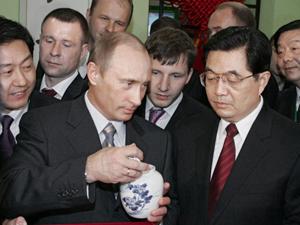Chinese president Hu Jintao arrived in Moscow on March 26, 2007 to begin a three-day state visit. Political observers have suggested that a new Chinese–Russian bilateral partnership may emerge as a direct result of discussions initiated during Hu’s visit.
Hu commented publicly about his objectives for the visit before leaving China and upon his arrival in Moscow. Hu said he was confident his visit to Moscow would help to strengthen political and economic ties between the two countries.
Analysts believe that Hu’s trip was targeted toward breakthroughs on a bilateral economic front, especially for further energy guarantees.
An integral topic during the visit is how to enhance bilateral political and economic cooperation with each other in the global arena, so as to leverage the United State’s influence.
Different Intentions Behind Possible Bilateral Cooperation
Hu believes that the establishment of a bilateral partnership with Russia will strengthen China’s influence on global affairs. With increased global economic and political influence, China’s negotiating position with the United States on matters of global importance will also be strengthened.
Experts agree that Chinese-Russia cooperation on military and energy fronts is a good idea. But past histories of mistrust and poor cooperation between the two giants are deeply rooted. Lack of a solid foundation for building improved cooperative strategies between the two countries may render any current or future discussions useless.
Current Chinese understandings of modern Russia are rooted in impressions from the 1950’s. Even Hu could only make references to old songs of friendship between the two countries when describing life in Russia today when interviewed by Russian reporters. The two songs “The plum blossoming” and “The evenings near Moscow” mentioned by Hu were last popular only during the Soviet era.
By the same token, most Russians don’t have a good understanding of life in modern China. In addition, the Russian envy of China’s strong economy only adds to fire to the misunderstandings.
Hot Politics, Cold Economics
Even though China and Russia share a common border, the volume of trade across this border amounts to only US$4 million per year, representing less than 2 percent of China’s total trade volume. Compared to China’s trade with the United States, Europe and Japan, this figure is insignificant.
Experts familiar with Russian issues are quick to point out that most Russians would be happy to see a reduced U.S. influence on global issues. From the perspective of stronger bilateral ties with China, many Russians are worried that sparsely populated eastern territories may one day be annexed as Chinese.
There are currently tens of thousands of Chinese living, working and running businesses in Russian Siberia. The Chinese presence has boosted the Siberian economy. It has also raised fears of what a stronger bilateral partnership with China may offer the average Russian. Vladimir Putin’s government emphasizes the importance of improving its relationship with China. But, at the same time, Russian nationalism and racist attitudes are solidly entrenched in the Russian mentality. It is not uncommon to hear that laborers and businessmen from Asia, including China, and Africa are attacked or insulted on the streets in Moscow.
The Russian government recently passed a controversial law that forbids immigrants from owning retail businesses. The primary targets of this law are the Chinese.
Experts have suggested that Hu’s objective for his state visit to Russia is to improve the political and economic relationship between the two powers. But, most experts are pessimistic that Hu’s objective will be achieved.
